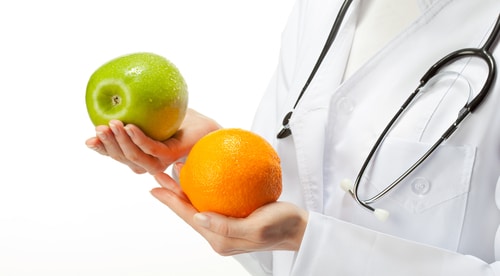 Suppose you’ve eaten a “not so healthy” diet most of your life. Instead of snacking on broccoli sprigs, you’ve munched on potato chips and cookies, and you never met a French fry you didn’t like. Boom! Then someone in your family has a heart attack, and you decide it’s time to change your eating habits. Just as you resolve to clean out your cabinets and refrigerator and restock them with healthier fare, you begin to wonder whether it’s too late to get the benefits of a healthy diet. After all, you’re into middle age. Is it ever too late to get the health benefits of improving your diet?
Suppose you’ve eaten a “not so healthy” diet most of your life. Instead of snacking on broccoli sprigs, you’ve munched on potato chips and cookies, and you never met a French fry you didn’t like. Boom! Then someone in your family has a heart attack, and you decide it’s time to change your eating habits. Just as you resolve to clean out your cabinets and refrigerator and restock them with healthier fare, you begin to wonder whether it’s too late to get the benefits of a healthy diet. After all, you’re into middle age. Is it ever too late to get the health benefits of improving your diet?
Adopting a Healthy Diet Even Late in Life Has Benefits
A study recently published in the Journal of American Geriatrics Society found that adopting a healthy diet combined with physical exercise extended the lifespan of women in their 70s. These women were part of a larger study called the Women’s Health and Aging Study. This study showed that women in their 70s who ate a diet rich in fruits and vegetables survived longer than women who didn’t. As a measure of their fruit and vegetable intake, they quantified plant pigments called carotenoids in the women’s bloodstream.
What are carotenoids? Carotenoids are antioxidants that give orange fruits and vegetables like carrots and sweet potatoes their color. They’re also found in substantial quality in green, leafy vegetables. These veggies don’t look orange because they have a high chlorophyll content that masks the carotenoids. In this study, women who had the highest carotenoid levels had a 46% lower risk of dying over the next five years compared to those who had the least.
Greater Longevity Power through the Power of Veggies and Exercise
Combine a diet rich in fruits and veggies with exercise, and you just might a recipe for longevity. In this study, women that exercised and ate antioxidant-rich fruits and veggies were almost eight times less likely to die over a five year period. That’s good news for women of any age.
The Longevity Benefits of Carotenoid-Rich Vegetables
Eating a diet rich in fruits and vegetables that contain carotenoids and other phytochemicals seems to have benefits regardless of how old you are. There are five main types of carotenoids, zeaxanthin, lycopene, lutein, alpha-carotene, and beta-carotene. Carotenoids are primarily found in fruits and vegetables that are red or orange in color as well as green, leafy vegetables and broccoli. Egg yolks are also a source of the carotenoid lutein that the body can readily use.
Carotenoids all have something in common. They help to protect cells against free radical damage or the natural damage and wear-and-tear cells undergo when they’re exposed to oxygen. Carotenoids essentially keep cells from “rusting,” which can lead to a wide range of diseases associated with aging including heart disease and some types of cancer. Carotenoids are also important for healthy vision, and they guard against age-related eye diseases like macular degeneration and cataracts. If that isn’t enough, they help to keep your immune system primed against invaders like viruses, bacteria and tumor cells.
Even though researchers didn’t measure levels of other antioxidants in the bloodstreams of these women, fruits and vegetables have other natural phytochemicals that help to protect against disease. In addition, they’re a good source of potassium and magnesium that help to lower blood pressure and counteract the effects of a high-salt diet.
The Bottom Line?
Adding more fruits and vegetables to your diet and staying active is one of the best things you can do to improve your health and keep age-related diseases at bay. Fortunately, they’re easy to come by, and there’s no need to swallow a pill. Just scoot your grocery cart over to the produce aisle.
References:
Science Daily. “Exercise and a Healthy Diet of Fruits and Vegetables Extends Life Expectancy in Women in Their 70s”
World’s Healthiest Foods website.
Related Articles By Cathe:
Can Eating Vegetables Make You Look Younger and More Attractive?
Can Eating More Vegetables Improve Exercise Performance?
4 Ways a Vegetable-Rich Diet Can Lower Your Blood Pressure
How Many People Are Really Living a Healthy Lifestyle? Prepare to Be Shocked

